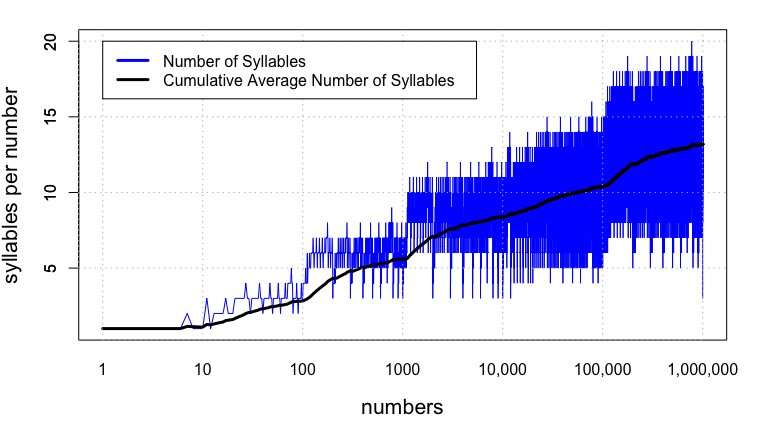My son likes large numbers (like septillion, googol and googolplex) and once asked me how long it would take to count to septillion (which is 1 followed by 24 zeros). I told him it would take longer than the age of the universe to do that, so he started working his way down. He asked me about counting to one million. I did a little math (assuming one number per second) and got about 11-12 days . . . but then thought, the large numbers (like 658,243) take more than a second to say.
Looked on the web a little to see if anyone else had done a more sophisticated calculation. Lots of calculations were like my own (assuming one number per second). Others acknowledge that it would take longer for large numbers and made assumptions about what that would be. But nothing definitive, so I thought I’d make one. This counting calculator is based on the number of syllables in every number and counts all the syllables you’d have to pronounce in order to count from one to one million (or other numbers).
If the calculator is not self-explanatory, there are several steps to follow:
First time yourself counting to 20. Based on your time, the calculator determines your counting rate in syllables per second (there are 32 syllables in the numbers between one and twenty). You can try to count the number of syllables yourself. Specify what number you’d like to count to, the default is one million but you can specify one billion or any number below one trillion. Specify how many hours per day you think you can count. Remember you need to eat and sleep and take breaks too. Push the button and it’ll tell you how long it takes to count to your target number.
You can vary different parameters (counting speed, hours per day and target number) to see how long counting might take. (Spoiler, if you count to large numbers, it can take a very long time!)
I also decided to plot the number of syllables in each number between one and a million. Not totally straightforward to plot one million points in an interactive fashion (where you can hover over the plot to see what numbers have how many syllables) so I ended up making a static image in R. It also shows the cumulative average number of syllables when counting up from one to the numbers below one million.
Here’s another one that’s somewhat annotated so you can see what the peaks and troughs are.
The numbers with the lowest number of syllables are the simplest numbers with the fewest words (i.e. one thousand, one million) while the numbers with the most syllables are the ones with the most words (i.e. seven hundred fifty six thousand four hundred twenty three). This is why the range of syllables is highest when you get over one hundred thousand. Seven has more syllables (2) than the other numbers between one and ten, and seventy has more syllables (3) than the other numbers when counting by tens. So 77 has the most syllables of all numbers below 100. The first set of peaks highlighted on the plot are due to 177, 277, 377 . . . 977, with a peak at 777 below 1000. The 2nd set is due to 1777, 2777, etc.
The troughs follow the same pattern where 100, 200 . . .900 have the same number of syllables, except for 700, which has one more. Same is true of thousands, tens of thousands and hundreds of thousands.
You can test the algorithm used to generate the word number from the number digits and the calculated number of syllables. The program skips the word “and” that people often use in numbers like “four hundred and twenty three” and just outputs “four hundred twenty three”.
Program and Data: The program was written in Javascript and runs locally in your browser. The static plots were generated in R (R Studio) from the output of the Javascript program.

limperschmit on February 26th, 2018 at 23:25 UTC »
I remember watching this guy back in college who counted to a million for charity. Kind of sad he only raised 10k for all that effort. https://en.m.wikipedia.org/wiki/Jeremy_Harper
Gasonfires on February 26th, 2018 at 23:03 UTC »
Kid in my second grade class wrote to a million. Two-sided with multiple columns per sheet. Took him months. He had to be persuaded to put it aside to pay attention in class or even go out for recess. Finally the teacher told him he couldn't bring it to school anymore. When he got done with it he brought it to her in a big department store gift box like you would use for a a heavy winter coat. He wanted her to check it for mistakes and give him extra credit for it. Broke his heart when she just drew a big star on top of his box and sent him back to his chair.
Edit: Something else came to mind. The teacher was a complete hottie and everyone adored her. I think the kid was in love and that's how he wanted to tell her.
StormKhroh on February 26th, 2018 at 22:47 UTC »
Assuming this was done for English, I think it would be really interesting to see the syllables for different languages and how they line up at different points. Maybe not zero to a million but I think at least for notable differences in counting systems, it would be pretty cool.